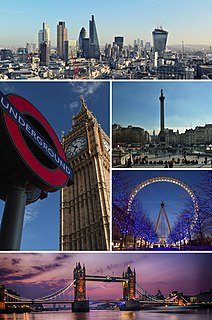
Thomas Moore was an Irish poet, singer, songwriter, and entertainer, now best remembered for the lyrics of "The Minstrel Boy" and "The Last Rose of Summer". As Lord Byron's named literary executor, along with John Murray, Moore was responsible for burning Lord Byron's memoirs after his death. In his lifetime he was often referred to as Anacreon Moore.

The Holkar dynasty was a Maratha clan of Dhangar origin in India. The Holkars were generals under Peshwa Baji Rao I, and later becane Maharajas of Indore in Central India as an independent member of the Maratha Empire until 1818. Later, their kingdom became a princely state under the protectorate of British India.
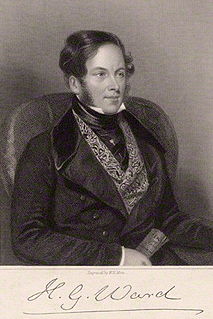
Sir Henry George Ward GCMG was an English diplomat, politician, and colonial administrator.

Johann Jacob Roemer was a physician and professor of botany in Zurich, Switzerland. He was also an entomologist.

Newton St Cyres is a village, civil parish former manor and former ecclesiastical parish in Mid Devon, in the English county of Devon, located between Crediton and Exeter. It had a population of 562 at the 2011 Census. The village is part of the Newbrooke electoral ward. The ward population at the above census was 1,520. Almost destroyed by fire in the early 1960s, its main point of interest is the Parish Church, built in the 15th century and dedicated to the martyrs St. Cyriac and his mother St. Julitta. Most of the church is in early Perpendicular style, built of local reddish 'trap', a volcanic stone from quarries at Posbury, with the exception of the nave pillars, which are of Beer stone. It contains the monument with standing effigy of John Northcote (1570-1632) of Hayne, lord of the manor of Newton St Cyres. Newton St Cyres railway station serves the Exeter to Barnstaple line.

Dawson Turner was an English banker, botanist and antiquary.
Sir Scrope Bernard-Morland, 4th Baronet was a British politician and baronet.
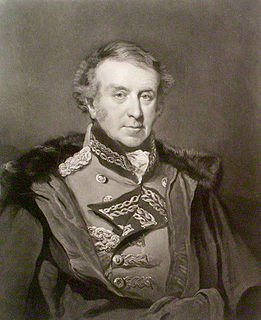
General Sir Hew Whitefoord Dalrymple, 1st Baronet was a British Army general and Governor of Gibraltar.

Henry Charles Andrews, was an English botanist, botanical artist and engraver.
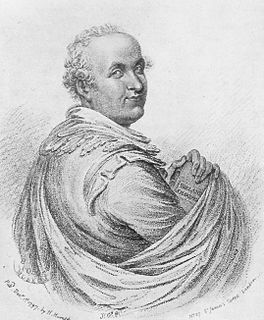
Samuel Ireland, English author and engraver, is best remembered today as the chief victim of the Ireland Shakespeare forgeries created by his son, William Henry Ireland.
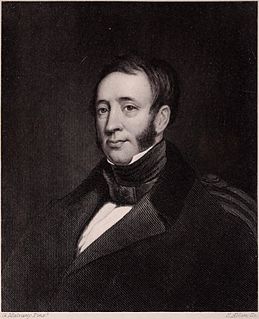
Richard Robert Madden was an Irish doctor, writer, abolitionist and historian of the United Irishmen. Madden took an active role in trying to impose anti-slavery rules in Jamaica on behalf of the British government.
Arthur Batt Bingham (1784–1830) was an officer in the Royal Navy, rising to the rank of post captain. He is remembered chiefly for his command of HMS Little Belt, when the Little Belt Affair occurred, just prior to the War of 1812.
Samuel Clapham (1755–1830) was a clergyman of the Church of England, a justice of the peace, and a writer. His best known work, the collection Practical Sermons on Several Important Subjects, published under the pseudonym Theophilus St. John, went through four editions.
John Law DD (1745–1810) was an English mathematician and clergyman who began his career as a Fellow of Christ's College, Cambridge, and went on to become chaplain to the Lord Lieutenant of Ireland and Church of Ireland bishop of Clonfert and Kilmacduagh (1782–1787), Killala and Achonry (1787–1795), and finally of Elphin (1795–1810).
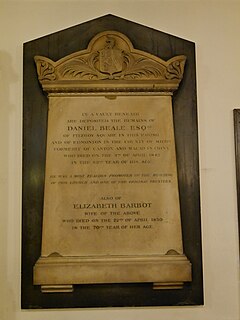
Daniel Beale (1759–1842) was a Scottish merchant and fur trader active in the Far East mercantile centres of Bombay, Canton and Macau as well as at one time the Prussian consul in China.
Francis Dobbs (1750–1811) was an Irish barrister, politician and writer on political, religious and historical topics.
Cathal Ainrí Ó Néill, or Charles Henry O'Neill, was the chieftain of the O'Neill dynasty of Clandeboye,, from 1855 until his death in 1865.

Daniel E. Bandmann was an internationally known German-American Shakespearean actor who after retiring from the stage became a noted Montana rancher. In 1885 Bandmann published An Actor's Tour: or, Seventy Thousand Miles with Shakespeare, chronicling his repertoire company’s near four-year tour of the Asia-Pacific region over the early 1880s. Bandmann was later credited for introducing McIntosh red apples for cultivation in western Montana.
Joseph Harper was an English-born and early American actor and theatre manager.

